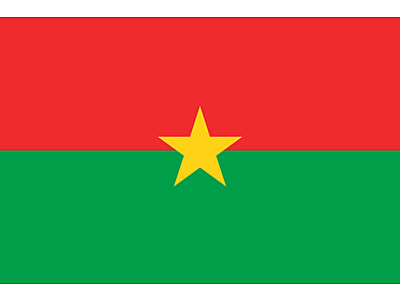Talk Africa: The collective culture of Burkina Faso
Posted by khethiwe qotyana on 29 March 2018, 12:05 SAST

by Remon Geyser (@remongeyser) Even though less than a million people have direct internet access, Burkina Faso is known for some of Africa’s most culturally diverse and unique events. From Africa’s largest film festival in the humble capital of Ouagadougou to the niché facilitation of an international marionette festival, Burkina Faso’s cultural scope offers something different.
Burkina Faso lies in a landlocked region of West Africa, a small country that is not often spoken about. The country, which encompasses a rich savanna and pockets of semi-desert, is generally not on the topic of trending conversation. This is unsurprising, as internet penetration stands only at 4.4% from a total population of 18 365 123 people (2014).
However, one shouldn’t discredit the rich, thriving cultural backbone that upholds this fascinating nation.
French is Burkina Faso’s official language. A relic from its European colonial predecessors, it has been an important part of Burkinabé culture since independence was gained. The vernacular is an archaic dialect called Móoré, derived from the Mossi ethnic group, from which 43% of the total population descend. More than 60 native tribes, using over 70 native languages, are sparsely pocketed throughout the country’s beautiful geography.
The culture of Burkina Faso’s online community, although small, is interesting to unpack. The realm of social media reflects insights into the psychographics of certain consumer markets. Regardless of the low percentile of online consumers, Burkina Faso, like many other Pan African nations, mostly follow much-loved politicians who have garnered a ‘likeable’ presence.
Cultural curiosities
FesPACO
Burkina Faso brings a playground of cultural delights to life with its unique annual events. FesPACO, or the Pan-African Film and Television Festival of Ouagadougou, takes place in March. One of the largest of its kind in Africa, the event features reels of film from all over the greater continent.
This year, which marked the 24th annual FesPACO, saw some controversy. French-Mauritian Oscar-nominated movie “Timbuktu” was screened with unease from the national government. There were concerns that the violent al-Qaeda content and supposed agenda of the film would compromise the security of the festival by making it a target. Burkina Faso has a shaky history regarding hostile militant conflict. However, to most audiences, the film screening was depicted as a “triumph for artistic freedom”.
The FesPACO is seen as a national pride as it serves as a benchmark for African film, promoting the reach and sharing in the creative unity of Pan-Africa. The event has placed a special cultural mark on Ouagadougou.
National Museum of Music
The National Museum of Music in Burkina Faso is an attraction unlike anything else in the world. The nation’s indigenous, homegrown musical instruments are displayed here. Not only renowned as a tourist’s window into Burkanibé traditional culture, the ancestral left-behinds and beautifully crafted items are national treasures. The instruments easily range from five to 200 years old.
FESTIVO
Lions Club International’s Burkina Faso division organises the culinary prowess of the country by organising and hosting FESTIVO — or The Ouagadougou Meat Festival. The city’s predominant abattoir is in full swing as the finest cuts of meat are sold to the public. A ‘different’ experience, this yearly food event certainly places a niché mark on the diversity of activities in the city.
Festival Waga Hip Hop
Festival Waga Hip Hop is a yearly event which helps to nurture the social threads of the country by promoting one of its fastest-growing music genres. It seeks to develop a shared bond and encourage the development of African music. Since its inception in 2001, Festival Waga has toured overseas and showcased African urban music at the Centre Musical Fleury Goutte d’Or Barbara in Paris. The cultural synergy has made a big impact for hip hop fans, as this relatively quiet nation can finally appeal to youth culture.
Including Africa’s largest arts and craft market, as well as an international theatre and marionette event, Burkina Faso is arguably best-known for its cultural impact on tourism and the rest of Pan-Africa.
International brands have an untapped market to sponsor a few of these events. In Burkina Faso, agencies would need to use traditional brand touchpoints to the best of their abilities. Billboards and print ads would fair well, especially when advertising in and around public transport hubs, as only 11 out of 1000 people use private transport in the form of motor vehicles.
Online: the culture of social media
A renowned Burkinabé Twitter celeb is former president Blaise Compaoré (resigned 2014). He boasts over 14 400 following his handle. This is again consistent with a Pan-African social media trend — politics. Many developing African countries’ Twitter users follow respected politicians that have improved social development or just outright resonate with the public. Although the reach and traffic might be small at first, there is a relatively large growth rate in internet penetration, by 16% per year.
Samuel Eto’o, a striker for the Cameroonian national football team is very popular in Burkina Faso’s social media, with roughly 68 500 local likes on Facebook. This suggests that Pan-Africanism support, whereby Africans are united in football regardless of country, is very much alive and well. This may be nurtured by the branding scene, perhaps using a Facebook campaign with Eto’o as the spokesperson. A perfect brand for this would be Coca-Cola, as it is about sharing open happiness and the spirit of Pan-African football is being networked across borders.
Take advantage
Overall, while Burkina Faso may not be the most-advanced African country when it comes to internet penetration, brands and agencies should therefore scope out the best traditional media to communicate with the greater markets.
However, there is an opportunity to take advantage of the cultural frameworks and drive the underlying concept of Pan-Africanism to the rest of Africa and for the world to experience.
http://www.marklives.com/2015/08/talk-africa-the-collective-culture-of-burkina-faso/
